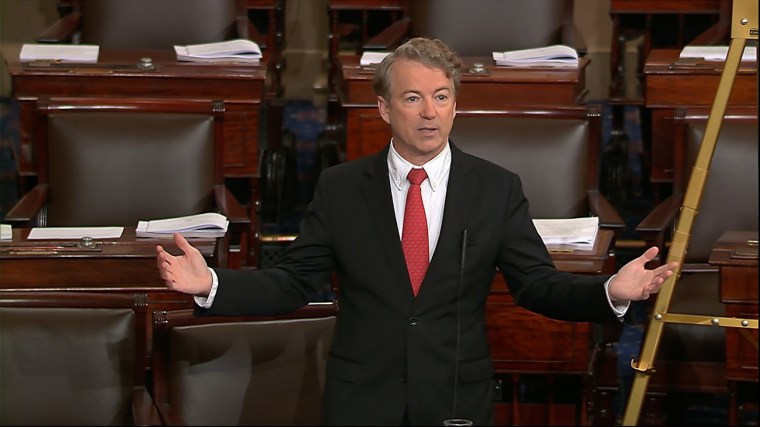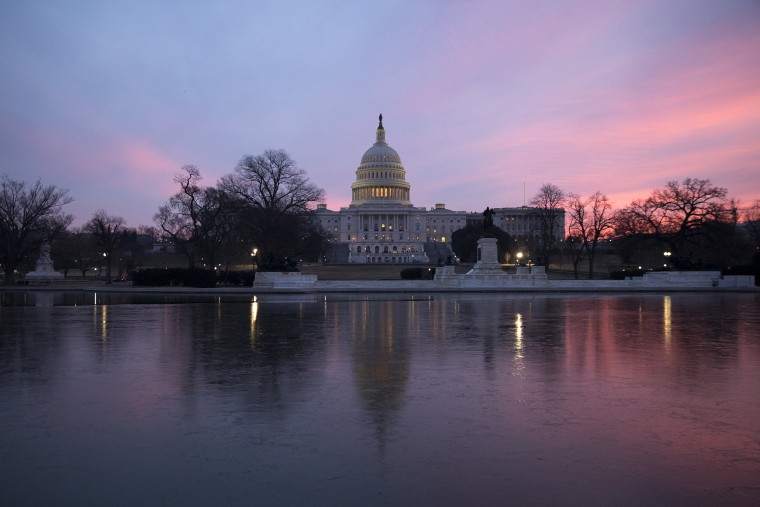WASHINGTON — Congress voted early Friday to pump a lot of federal dollars into the economy just a few weeks after they voted to take a lot less in federal taxes out of the economy. The resulting changes, according to outside estimates, are likely to mean trillion-dollar deficits well into the future.
The impact on the U.S. economy is less clear. Experts say the latest moves could boost the economy in the short term, but they’re divided on how large the effect may be and whether negative consequences could soon overtake it. And experts of all stripes are confused about the bottom line question: With the economy already growing, why would Congress choose this particular moment to pile on long-term debt?
The new legislation is expected to add at least $320 billion to the deficit over the next decade to go with a $1.5 trillion increase from the recently passed tax cuts. It’s an abrupt change after an eight-year period in which Republican leaders forced President Obama to accept new spending restrictions, which the new legislation removed.
How analysts feel about Friday's spending bump, especially on the center-left, depends a lot on where they think the economy stands today. If the unemployment rate still has room to drop, as some believe, a push from the government could create jobs and encourage higher wages.
“Given how close we are to full employment, it’s highly unusual to have the deficit as a share of GDP at 4 percent to 6 percent over the next few years, but ‘unusual’ isn’t necessarily bad,” Jared Bernstein, a Senior Fellow at the Center on Budget and Policy Priorities, told NBC News. “It all comes down to whether you think there’s still some slack left in the US economy.”
Some progressive economists have long complained that Republicans have been too timid about spending in order to encourage more hiring. Dean Baker, co-founder of the Center for Economic and Policy Research, called the budget deal a “new stimulus package,” a dry reference to the $787 billion bill Obama signed in 2009 to boost the economy — and that Republicans almost unanimously opposed.
“At the end of the day I’m looking at it positively,” Baker said.
If the economy is close to full employment, however, economists worry an infusion of spending and tax cuts could cause growth to speed up too much. That could spike inflation and prompt new countermeasures from the Federal Reserve to rein it in.
“Between the tax cuts and now the increase in spending, there is a serious risk that the economy could overheat,” Gus Faucher, Chief Economist at PNC Financial Services Group, told NBC News. “This could cause the Fed to raise interest rates more aggressively, which in turn could lead to recession further down the line.”
That scenario would be less likely to happen in 2018, however, according to Faucher. He expected unemployment to decline further, perhaps as low as 3.5 percent.
While the overall effects of the budget and tax cuts are a matter of debate, the timing has economists scratching their heads.
Some conservatives argue for balanced budgets on principle, but there’s generally been a broad consensus that it’s better to run deficits in order to stimulate a weak economy rather than turbocharge a strong one. But now, the same Republican lawmakers who demanded spending cuts after a recession in which the unemployment rate peaked at 10 percent decided to go on a spree with that rate at 4.1 percent and trending downward.

“This is the first time I’m aware of that we’ve voluntarily brought the deficit so high when there wasn’t either a big recession or a big war,” said Brian Riedl, a senior fellow at the Manhattan Institute and former advisor to Senator Rob Portman, R-Ohio. “We’re doing fiscal policy exactly backwards.”
The nature of the new projected deficits is also different than other recent bumps. Rather than a targeted temporary measure, like a bailout or a stimulus bill or a tax holiday, the new measures are widely expected to become the new baseline. The Committee for a Responsible Budget, which advocates for fiscal restraint, estimates the deficit next year will be $1.2 trillion and could rise to $2 trillion over the next decade.
“It’s really hard to paint a picture of getting back to a sustainable fiscal situation — ever,” said Marc Goldwein, Senior Vice President at the Committee for a Responsible Federal Budget. He described himself as “enthusiastically angry” about the latest moves.
Goldwein and other fiscal hawks see a variety of potential consequences in the long term. If persistent deficit spending causes interest rates to rise, it could make it harder for customers to get a mortgage or businesses to secure a loan and require the federal government to spend more and more servicing its existing debt. That could limit policymakers' ability to respond to a future economic crisis, like the 2008 crash, or prompt them to pass larger tax increases or spending cuts to bring the deficit under control.
“I think in the next five or 10 years, the economic harm will become much more visible,” Riedl said. “One of the first things we will see is the soaring budget deficits possibly forcing up taxes or forcing dramatic spending cuts to programs people care about. “
For some conservatives that’s a feature, not a bug. By cutting tax revenue in the short term to “starve the beast,” they hope to force future lawmakers to make major cuts to entitlement programs like Social Security, Medicare, and Medicaid to bring it back into balance.
But Riedl, who called the situation “potentially catastrophic,” worried the political impact of broad spending increases and major tax cuts now would likely make those efforts harder.
“If voters believe corporations are getting big tax benefits, they sure as hell won’t expect a cut in their benefits,” he said.
The latest bill offered a reminder of how difficult the politics of deficit reduction can be. The legislation repealed the Independent Payment Advisory Board, a group created by the Affordable Care Act to find ways to rein in Medicare costs if they grew too fast — the same group derided by some conspiracy-minded conservatives as a "death panel" in 2010, as Republicans ran campaign ads that attacked Democrats for reducing Medicare spending.
